Graduate
-
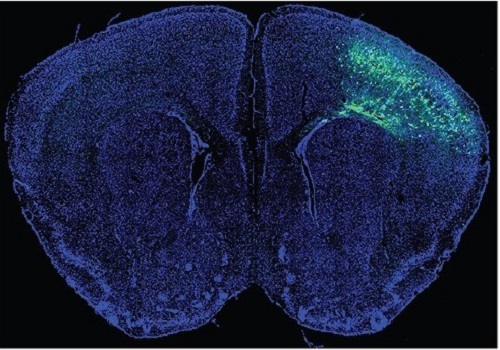 A Mechanism Underlying Most Common Cause of Epileptic Seizures Revealed
An interdisciplinary study shows that neurons carrying somatic mutations in MTOR can lead to focal epileptogenesis via non-cell-autonomous hyperexcitability of nearby nonmutated neurons
During fetal development, cells should migrate to the outer edge of the brain to form critical connections for information transfer and regulation in the body. When even a few cells fail to move to the correct location, the neurons become disorganized and this results in focal cortical dysplasia. This condition is the most common cause of seizures that cannot be controlled with medication in children and the second most common cause in adults.
Now, an interdisciplinary team studying neurogenetics, neural networks, and neurophysiology at KAIST has revealed how dysfunctions in even a small percentage of cells can cause disorder across the entire brain. They published their results on June 28 in Annals of Neurology.
The work builds on a previous finding, also by a KAIST scientists, who found that focal cortical dysplasia was caused by mutations in the cells involved in mTOR, a pathway that regulates signaling between neurons in the brain.
“Only 1 to 2% of neurons carrying mutations in the mTOR signaling pathway that regulates cell signaling in the brain have been found to include seizures in animal models of focal cortical dysplasia,” said Professor Jong-Woo Sohn from the Department of Biological Sciences. “The main challenge of this study was to explain how nearby non-mutated neurons are hyperexcitable.”
Initially, the researchers hypothesized that the mutated cells affected the number of excitatory and inhibitory synapses in all neurons, mutated or not. These neural gates can trigger or halt activity, respectively, in other neurons. Seizures are a result of extreme activity, called hyperexcitability. If the mutated cells upend the balance and result in more excitatory cells, the researchers thought, it made sense that the cells would be more susceptible to hyperexcitability and, as a result, seizures.
“Contrary to our expectations, the synaptic input balance was not changed in either the mutated or non-mutated neurons,” said Professor Jeong Ho Lee from the Graduate School of Medical Science and Engineering. “We turned our attention to a protein overproduced by mutated neurons.”
The protein is adenosine kinase, which lowers the concentration of adenosine. This naturally occurring compound is an anticonvulsant and works to relax vessels. In mice engineered to have focal cortical dysplasia, the researchers injected adenosine to replace the levels lowered by the protein. It worked and the neurons became less excitable.
“We demonstrated that augmentation of adenosine signaling could attenuate the excitability of non-mutated neurons,” said Professor Se-Bum Paik from the Department of Bio and Brain Engineering.
The effect on the non-mutated neurons was the surprising part, according to Paik. “The seizure-triggering hyperexcitability originated not in the mutation-carrying neurons, but instead in the nearby non-mutated neurons,” he said.
The mutated neurons excreted more adenosine kinase, reducing the adenosine levels in the local environment of all the cells. With less adenosine, the non-mutated neurons became hyperexcitable, leading to seizures.
“While we need further investigate into the relationship between the concentration of adenosine and the increased excitation of nearby neurons, our results support the medical use of drugs to activate adenosine signaling as a possible treatment pathway for focal cortical dysplasia,” Professor Lee said.
The Suh Kyungbae Foundation, the Korea Health Technology Research and Development Project, the Ministry of Health & Welfare, and the National Research Foundation in Korea funded this work.
-Publication:Koh, H.Y., Jang, J., Ju, S.H., Kim, R., Cho, G.-B., Kim, D.S., Sohn, J.-W., Paik, S.-B. and Lee, J.H. (2021), ‘Non–Cell Autonomous Epileptogenesis in Focal Cortical Dysplasia’ Annals of Neurology, 90: 285 299. (https://doi.org/10.1002/ana.26149)
-ProfileProfessor Jeong Ho Lee Translational Neurogenetics Labhttps://tnl.kaist.ac.kr/ Graduate School of Medical Science and Engineering KAIST
Professor Se-Bum Paik Visual System and Neural Network Laboratory http://vs.kaist.ac.kr/ Department of Bio and Brain EngineeringKAIST
Professor Jong-Woo Sohn Laboratory for Neurophysiology, https://sites.google.com/site/sohnlab2014/home Department of Biological SciencesKAIST
Dr. Hyun Yong Koh Translational Neurogenetics LabGraduate School of Medical Science and EngineeringKAIST
Dr. Jaeson Jang Ph.D.Visual System and Neural Network LaboratoryDepartment of Bio and Brain Engineering KAIST
Sang Hyeon Ju M.D.Laboratory for NeurophysiologyDepartment of Biological SciencesKAIST
2021.08.26 View 14980
A Mechanism Underlying Most Common Cause of Epileptic Seizures Revealed
An interdisciplinary study shows that neurons carrying somatic mutations in MTOR can lead to focal epileptogenesis via non-cell-autonomous hyperexcitability of nearby nonmutated neurons
During fetal development, cells should migrate to the outer edge of the brain to form critical connections for information transfer and regulation in the body. When even a few cells fail to move to the correct location, the neurons become disorganized and this results in focal cortical dysplasia. This condition is the most common cause of seizures that cannot be controlled with medication in children and the second most common cause in adults.
Now, an interdisciplinary team studying neurogenetics, neural networks, and neurophysiology at KAIST has revealed how dysfunctions in even a small percentage of cells can cause disorder across the entire brain. They published their results on June 28 in Annals of Neurology.
The work builds on a previous finding, also by a KAIST scientists, who found that focal cortical dysplasia was caused by mutations in the cells involved in mTOR, a pathway that regulates signaling between neurons in the brain.
“Only 1 to 2% of neurons carrying mutations in the mTOR signaling pathway that regulates cell signaling in the brain have been found to include seizures in animal models of focal cortical dysplasia,” said Professor Jong-Woo Sohn from the Department of Biological Sciences. “The main challenge of this study was to explain how nearby non-mutated neurons are hyperexcitable.”
Initially, the researchers hypothesized that the mutated cells affected the number of excitatory and inhibitory synapses in all neurons, mutated or not. These neural gates can trigger or halt activity, respectively, in other neurons. Seizures are a result of extreme activity, called hyperexcitability. If the mutated cells upend the balance and result in more excitatory cells, the researchers thought, it made sense that the cells would be more susceptible to hyperexcitability and, as a result, seizures.
“Contrary to our expectations, the synaptic input balance was not changed in either the mutated or non-mutated neurons,” said Professor Jeong Ho Lee from the Graduate School of Medical Science and Engineering. “We turned our attention to a protein overproduced by mutated neurons.”
The protein is adenosine kinase, which lowers the concentration of adenosine. This naturally occurring compound is an anticonvulsant and works to relax vessels. In mice engineered to have focal cortical dysplasia, the researchers injected adenosine to replace the levels lowered by the protein. It worked and the neurons became less excitable.
“We demonstrated that augmentation of adenosine signaling could attenuate the excitability of non-mutated neurons,” said Professor Se-Bum Paik from the Department of Bio and Brain Engineering.
The effect on the non-mutated neurons was the surprising part, according to Paik. “The seizure-triggering hyperexcitability originated not in the mutation-carrying neurons, but instead in the nearby non-mutated neurons,” he said.
The mutated neurons excreted more adenosine kinase, reducing the adenosine levels in the local environment of all the cells. With less adenosine, the non-mutated neurons became hyperexcitable, leading to seizures.
“While we need further investigate into the relationship between the concentration of adenosine and the increased excitation of nearby neurons, our results support the medical use of drugs to activate adenosine signaling as a possible treatment pathway for focal cortical dysplasia,” Professor Lee said.
The Suh Kyungbae Foundation, the Korea Health Technology Research and Development Project, the Ministry of Health & Welfare, and the National Research Foundation in Korea funded this work.
-Publication:Koh, H.Y., Jang, J., Ju, S.H., Kim, R., Cho, G.-B., Kim, D.S., Sohn, J.-W., Paik, S.-B. and Lee, J.H. (2021), ‘Non–Cell Autonomous Epileptogenesis in Focal Cortical Dysplasia’ Annals of Neurology, 90: 285 299. (https://doi.org/10.1002/ana.26149)
-ProfileProfessor Jeong Ho Lee Translational Neurogenetics Labhttps://tnl.kaist.ac.kr/ Graduate School of Medical Science and Engineering KAIST
Professor Se-Bum Paik Visual System and Neural Network Laboratory http://vs.kaist.ac.kr/ Department of Bio and Brain EngineeringKAIST
Professor Jong-Woo Sohn Laboratory for Neurophysiology, https://sites.google.com/site/sohnlab2014/home Department of Biological SciencesKAIST
Dr. Hyun Yong Koh Translational Neurogenetics LabGraduate School of Medical Science and EngineeringKAIST
Dr. Jaeson Jang Ph.D.Visual System and Neural Network LaboratoryDepartment of Bio and Brain Engineering KAIST
Sang Hyeon Ju M.D.Laboratory for NeurophysiologyDepartment of Biological SciencesKAIST
2021.08.26 View 14980 -
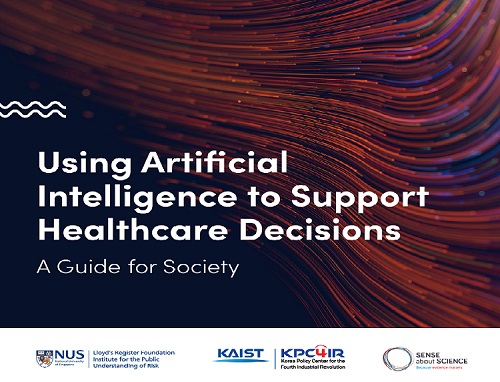 KAIST KPC4IR Presents the AI Global Guide for Healthcare
The benchmark for the responsible usage of AI technology in the healthcare sector will promote clarity and high standards for technological applications
The KAIST Korea Policy Center for the Fourth Industrial Revolution (KPC4IR) published 'Using AI to Support Healthcare Decisions: A Guide for Society.' This global guide is designed to serve as a benchmark for the responsible usage of AI technologies, and will promote clarity and high standards for technological applications in the healthcare sector. The guide details what should be considered when making clinical decisions to help reduce the chances of the AI giving false or misleading results.
The KPC4IR presented the guide in collaboration with the Lloyd’s Register Foundation Institute for the Public Understanding of Risk at the National University of Singapore (NUS IPUR) and Sense about Science, a non-profit organization in the UK specialized in science communication, during the 2021 SIG-KDD (Special Interest Group on Knowledge Discovery and Data Mining) Conference on August 15.
AI technology is being widely used in the healthcare sector and has already proved its accuracy and efficiency in diagnosing and predicting diseases. Despite its huge impact on our daily lives in every sector of society, AI technology has some drawbacks and comes with risks, especially due to biased algorithms.
“We focused on the ‘reliability’ of AI applications in the healthcare sector to make all data well represented, in good quality. The technology will eventually innovate to better serve the people’s new demand, especially critical demands for safety and precision in healthcare services. This global guide will help both developers and people’s understanding of the appropriate technology applications,” says Director So Young Kim at the KPC4IR.
The guide, for instance, says that to scrutinize quality and reliability, the source of the data must be clearly known; the data must have been collected or selected for the purpose it’s being used for; the limitations and assumptions for that purpose have been clearly stated; the biases have been addressed; and it has been properly tested in the real world. It also reflects the importance of the representativeness of data that will affect the accuracy of the AI applications.
“By being transparent and demonstrating the steps taken to check that the AI is reliable, researchers and developers can help give people confidence about providing their data,” the guide states.
For this guide, the KPC4IR and its collaborators collected data after working with numerous experts from the Graduate School of AI at KAIST, the Science and Technology Policy Institute in Korea, Asan Medical Center in Seoul, Seoul National University Bundang Hospital, and AI solution companies.
2021.08.17 View 9466
KAIST KPC4IR Presents the AI Global Guide for Healthcare
The benchmark for the responsible usage of AI technology in the healthcare sector will promote clarity and high standards for technological applications
The KAIST Korea Policy Center for the Fourth Industrial Revolution (KPC4IR) published 'Using AI to Support Healthcare Decisions: A Guide for Society.' This global guide is designed to serve as a benchmark for the responsible usage of AI technologies, and will promote clarity and high standards for technological applications in the healthcare sector. The guide details what should be considered when making clinical decisions to help reduce the chances of the AI giving false or misleading results.
The KPC4IR presented the guide in collaboration with the Lloyd’s Register Foundation Institute for the Public Understanding of Risk at the National University of Singapore (NUS IPUR) and Sense about Science, a non-profit organization in the UK specialized in science communication, during the 2021 SIG-KDD (Special Interest Group on Knowledge Discovery and Data Mining) Conference on August 15.
AI technology is being widely used in the healthcare sector and has already proved its accuracy and efficiency in diagnosing and predicting diseases. Despite its huge impact on our daily lives in every sector of society, AI technology has some drawbacks and comes with risks, especially due to biased algorithms.
“We focused on the ‘reliability’ of AI applications in the healthcare sector to make all data well represented, in good quality. The technology will eventually innovate to better serve the people’s new demand, especially critical demands for safety and precision in healthcare services. This global guide will help both developers and people’s understanding of the appropriate technology applications,” says Director So Young Kim at the KPC4IR.
The guide, for instance, says that to scrutinize quality and reliability, the source of the data must be clearly known; the data must have been collected or selected for the purpose it’s being used for; the limitations and assumptions for that purpose have been clearly stated; the biases have been addressed; and it has been properly tested in the real world. It also reflects the importance of the representativeness of data that will affect the accuracy of the AI applications.
“By being transparent and demonstrating the steps taken to check that the AI is reliable, researchers and developers can help give people confidence about providing their data,” the guide states.
For this guide, the KPC4IR and its collaborators collected data after working with numerous experts from the Graduate School of AI at KAIST, the Science and Technology Policy Institute in Korea, Asan Medical Center in Seoul, Seoul National University Bundang Hospital, and AI solution companies.
2021.08.17 View 9466 -
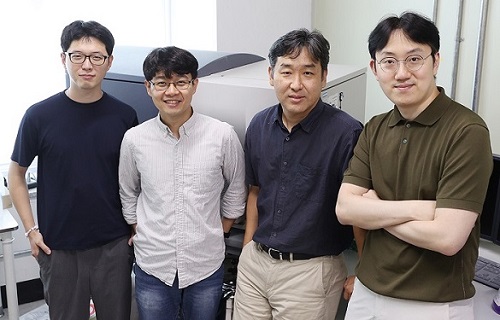 A Study Reveals What Triggers Lung Damage during COVID-19
A longitudinal study of macrophages from SARS-CoV-2 infected lungs offers new insights into dynamic immunological changes
A KAIST immunology research team found that a specific subtype of macrophages that originated from blood monocytes plays a key role in the hyper-inflammatory response in SARS-CoV-2 infected lungs, by performing single-cell RNA sequencing of bronchoalveolar lavage fluid cells. This study provides new insights for understanding dynamic changes in immune responses to COVID-19.
In the early phase of COVID-19, SARS-CoV-2 infected lung tissue and the immediate defense system is activated. This early and fast response is called ‘innate immunity,’ provided by immune cells residing in lungs. Macrophages are major cell types of the innate immune system of the lungs, and newly differentiated macrophages originating from the bloodstream also contribute to early defenses against viruses.
Professor Su-Hyung Park and his collaborators investigated the quantitative and qualitative evaluation of immune responses in the lungs of SARS-CoV-2 infected ferrets. To overcome the limitations of research using patient-originated specimens, the researchers used a ferret infection model to obtain SARS-CoV-2 infected lungs sequentially with a defined time interval.
The researchers analyzed the 10 subtypes of macrophages during the five-day course of SARS-CoV-2 infection, and found that infiltrating macrophages originating from activated monocytes in the blood were key players for viral clearance as well as damaged lung tissue. Moreover, they found that the differentiation process of these inflammatory macrophages resembled the immune responses in the lung tissue of severe COVID-19 patients.
Currently, the research team is conducting a follow-up study to identify the dynamic changes in immune responses during the use of immunosuppressive agents to control hyper-inflammatory response called ‘cytokine storm’ in patients with COVID-19.
Dr. Jeong Seok Lee, the chief medical officer at Genome Insight Inc., explained, “Our analysis will enhance the understanding of the early features of COVID-19 immunity and provide a scientific background for the more precise use of immunosuppressive agents targeting specific macrophage subtypes.”
“This study is the first longitudinal study using sequentially obtained immune cells originating from SARS-CoV-2 infected lungs. The research describes the innate immune response to COVID-19 using single cell transcriptome data and enhances our understanding of the two phases of inflammatory responses,” Professor Park said.
This work was supported by the Ministry of Health and Welfare and KAIST, and was published in Nature Communications on July 28.
-PublicationSu-Hyung Park, Jeong Seok Lee, Su-Hyung Park et al. “Single-cell transcriptome of bronchoalverolar lavage fluid reveals sequential change of macrophages during SARS-CoV-2 infection in ferrets” Nature Communications (https://doi.org/10.1038/s41467-021-24807-0)
-ProfileProfessor Su-Hyung ParkLaboratory of Translational Immunology and Vaccinologyhttps://ltiv.kaist.ac.kr/
Graduate School of Medical Science and EngineeringKAIST
2021.08.04 View 14029
A Study Reveals What Triggers Lung Damage during COVID-19
A longitudinal study of macrophages from SARS-CoV-2 infected lungs offers new insights into dynamic immunological changes
A KAIST immunology research team found that a specific subtype of macrophages that originated from blood monocytes plays a key role in the hyper-inflammatory response in SARS-CoV-2 infected lungs, by performing single-cell RNA sequencing of bronchoalveolar lavage fluid cells. This study provides new insights for understanding dynamic changes in immune responses to COVID-19.
In the early phase of COVID-19, SARS-CoV-2 infected lung tissue and the immediate defense system is activated. This early and fast response is called ‘innate immunity,’ provided by immune cells residing in lungs. Macrophages are major cell types of the innate immune system of the lungs, and newly differentiated macrophages originating from the bloodstream also contribute to early defenses against viruses.
Professor Su-Hyung Park and his collaborators investigated the quantitative and qualitative evaluation of immune responses in the lungs of SARS-CoV-2 infected ferrets. To overcome the limitations of research using patient-originated specimens, the researchers used a ferret infection model to obtain SARS-CoV-2 infected lungs sequentially with a defined time interval.
The researchers analyzed the 10 subtypes of macrophages during the five-day course of SARS-CoV-2 infection, and found that infiltrating macrophages originating from activated monocytes in the blood were key players for viral clearance as well as damaged lung tissue. Moreover, they found that the differentiation process of these inflammatory macrophages resembled the immune responses in the lung tissue of severe COVID-19 patients.
Currently, the research team is conducting a follow-up study to identify the dynamic changes in immune responses during the use of immunosuppressive agents to control hyper-inflammatory response called ‘cytokine storm’ in patients with COVID-19.
Dr. Jeong Seok Lee, the chief medical officer at Genome Insight Inc., explained, “Our analysis will enhance the understanding of the early features of COVID-19 immunity and provide a scientific background for the more precise use of immunosuppressive agents targeting specific macrophage subtypes.”
“This study is the first longitudinal study using sequentially obtained immune cells originating from SARS-CoV-2 infected lungs. The research describes the innate immune response to COVID-19 using single cell transcriptome data and enhances our understanding of the two phases of inflammatory responses,” Professor Park said.
This work was supported by the Ministry of Health and Welfare and KAIST, and was published in Nature Communications on July 28.
-PublicationSu-Hyung Park, Jeong Seok Lee, Su-Hyung Park et al. “Single-cell transcriptome of bronchoalverolar lavage fluid reveals sequential change of macrophages during SARS-CoV-2 infection in ferrets” Nature Communications (https://doi.org/10.1038/s41467-021-24807-0)
-ProfileProfessor Su-Hyung ParkLaboratory of Translational Immunology and Vaccinologyhttps://ltiv.kaist.ac.kr/
Graduate School of Medical Science and EngineeringKAIST
2021.08.04 View 14029 -
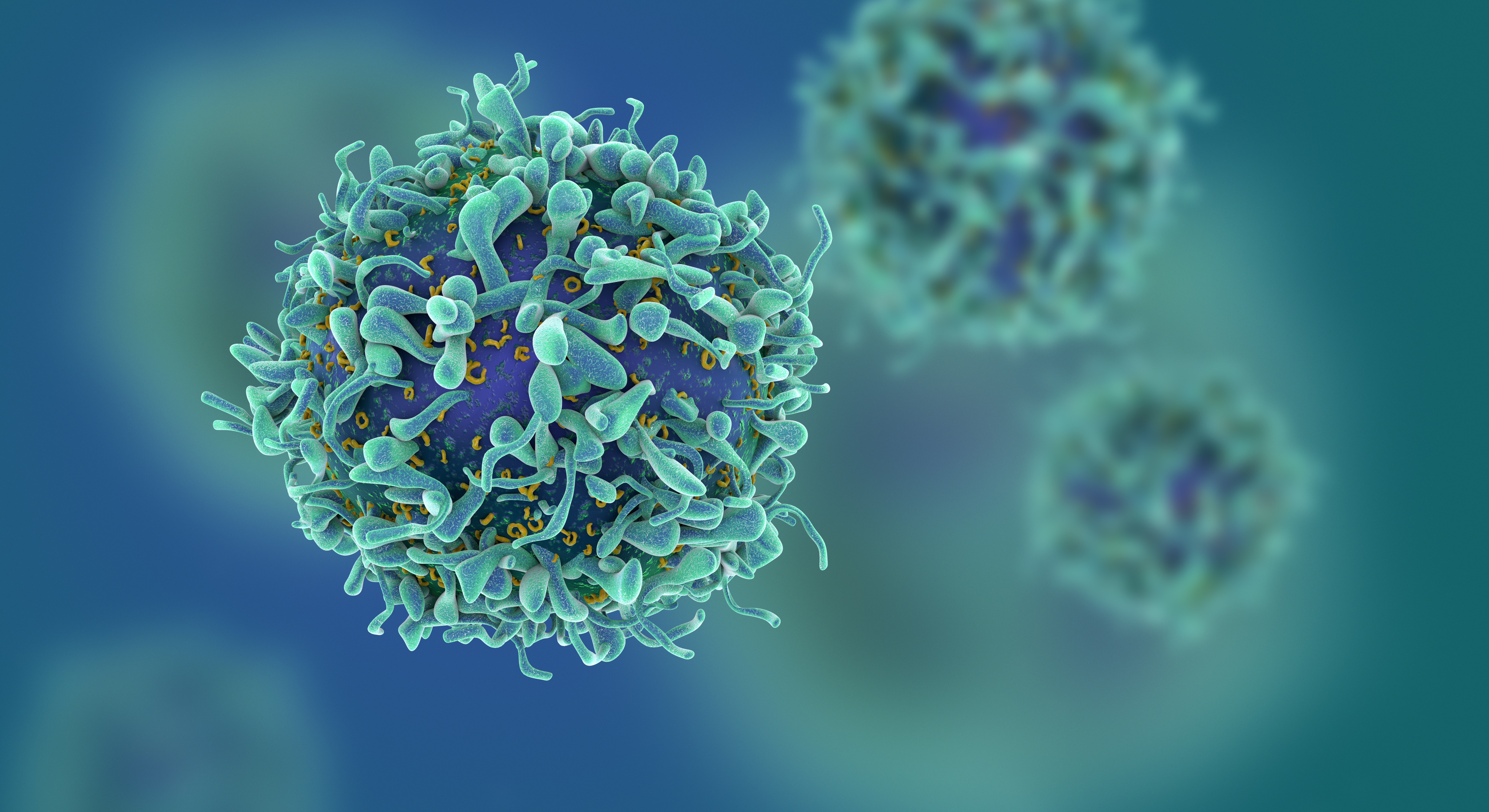 Study of T Cells from COVID-19 Convalescents Guides Vaccine Strategies
Researchers confirm that most COVID-19 patients in their convalescent stage carry stem cell-like memory T cells for months
A KAIST immunology research team found that most convalescent patients of COVID-19 develop and maintain T cell memory for over 10 months regardless of the severity of their symptoms. In addition, memory T cells proliferate rapidly after encountering their cognate antigen and accomplish their multifunctional roles. This study provides new insights for effective vaccine strategies against COVID-19, considering the self-renewal capacity and multipotency of memory T cells.
COVID-19 is a disease caused by severe acute respiratory syndrome coronavirus-2 (SARS-CoV-2) infection. When patients recover from COVID-19, SARS-CoV-2-specific adaptive immune memory is developed. The adaptive immune system consists of two principal components: B cells that produce antibodies and T cells that eliminate infected cells. The current results suggest that the protective immune function of memory T cells will be implemented upon re-exposure to SARS-CoV-2.
Recently, the role of memory T cells against SARS-CoV-2 has been gaining attention as neutralizing antibodies wane after recovery. Although memory T cells cannot prevent the infection itself, they play a central role in preventing the severe progression of COVID-19. However, the longevity and functional maintenance of SARS-CoV-2-specific memory T cells remain unknown.
Professor Eui-Cheol Shin and his collaborators investigated the characteristics and functions of stem cell-like memory T cells, which are expected to play a crucial role in long-term immunity. Researchers analyzed the generation of stem cell-like memory T cells and multi-cytokine producing polyfunctional memory T cells, using cutting-edge immunological techniques.
This research is significant in that revealing the long-term immunity of COVID-19 convalescent patients provides an indicator regarding the long-term persistence of T cell immunity, one of the main goals of future vaccine development, as well as evaluating the long-term efficacy of currently available COVID-19 vaccines.
The research team is presently conducting a follow-up study to identify the memory T cell formation and functional characteristics of those who received COVID-19 vaccines, and to understand the immunological effect of COVID-19 vaccines by comparing the characteristics of memory T cells from vaccinated individuals with those of COVID-19 convalescent patients.
PhD candidate Jae Hyung Jung and Dr. Min-Seok Rha, a clinical fellow at Yonsei Severance Hospital, who led the study together explained, “Our analysis will enhance the understanding of COVID-19 immunity and establish an index for COVID-19 vaccine-induced memory T cells.”
“This study is the world’s longest longitudinal study on differentiation and functions of memory T cells among COVID-19 convalescent patients. The research on the temporal dynamics of immune responses has laid the groundwork for building a strategy for next-generation vaccine development,” Professor Shin added. This work was supported by the Samsung Science and Technology Foundation and KAIST, and was published in Nature Communications on June 30.
-Publication:
Jung, J.H., Rha, MS., Sa, M. et al. SARS-CoV-2-specific T cell memory is sustained in COVID-19 convalescent patients for 10 months with successful development of stem cell-like memory T cells. Nat Communications 12, 4043 (2021). https://doi.org/10.1038/s41467-021-24377-1
-Profile:
Professor Eui-Cheol Shin
Laboratory of Immunology & Infectious Diseases (http://liid.kaist.ac.kr/)
Graduate School of Medical Science and Engineering
KAIST
2021.07.05 View 15056
Study of T Cells from COVID-19 Convalescents Guides Vaccine Strategies
Researchers confirm that most COVID-19 patients in their convalescent stage carry stem cell-like memory T cells for months
A KAIST immunology research team found that most convalescent patients of COVID-19 develop and maintain T cell memory for over 10 months regardless of the severity of their symptoms. In addition, memory T cells proliferate rapidly after encountering their cognate antigen and accomplish their multifunctional roles. This study provides new insights for effective vaccine strategies against COVID-19, considering the self-renewal capacity and multipotency of memory T cells.
COVID-19 is a disease caused by severe acute respiratory syndrome coronavirus-2 (SARS-CoV-2) infection. When patients recover from COVID-19, SARS-CoV-2-specific adaptive immune memory is developed. The adaptive immune system consists of two principal components: B cells that produce antibodies and T cells that eliminate infected cells. The current results suggest that the protective immune function of memory T cells will be implemented upon re-exposure to SARS-CoV-2.
Recently, the role of memory T cells against SARS-CoV-2 has been gaining attention as neutralizing antibodies wane after recovery. Although memory T cells cannot prevent the infection itself, they play a central role in preventing the severe progression of COVID-19. However, the longevity and functional maintenance of SARS-CoV-2-specific memory T cells remain unknown.
Professor Eui-Cheol Shin and his collaborators investigated the characteristics and functions of stem cell-like memory T cells, which are expected to play a crucial role in long-term immunity. Researchers analyzed the generation of stem cell-like memory T cells and multi-cytokine producing polyfunctional memory T cells, using cutting-edge immunological techniques.
This research is significant in that revealing the long-term immunity of COVID-19 convalescent patients provides an indicator regarding the long-term persistence of T cell immunity, one of the main goals of future vaccine development, as well as evaluating the long-term efficacy of currently available COVID-19 vaccines.
The research team is presently conducting a follow-up study to identify the memory T cell formation and functional characteristics of those who received COVID-19 vaccines, and to understand the immunological effect of COVID-19 vaccines by comparing the characteristics of memory T cells from vaccinated individuals with those of COVID-19 convalescent patients.
PhD candidate Jae Hyung Jung and Dr. Min-Seok Rha, a clinical fellow at Yonsei Severance Hospital, who led the study together explained, “Our analysis will enhance the understanding of COVID-19 immunity and establish an index for COVID-19 vaccine-induced memory T cells.”
“This study is the world’s longest longitudinal study on differentiation and functions of memory T cells among COVID-19 convalescent patients. The research on the temporal dynamics of immune responses has laid the groundwork for building a strategy for next-generation vaccine development,” Professor Shin added. This work was supported by the Samsung Science and Technology Foundation and KAIST, and was published in Nature Communications on June 30.
-Publication:
Jung, J.H., Rha, MS., Sa, M. et al. SARS-CoV-2-specific T cell memory is sustained in COVID-19 convalescent patients for 10 months with successful development of stem cell-like memory T cells. Nat Communications 12, 4043 (2021). https://doi.org/10.1038/s41467-021-24377-1
-Profile:
Professor Eui-Cheol Shin
Laboratory of Immunology & Infectious Diseases (http://liid.kaist.ac.kr/)
Graduate School of Medical Science and Engineering
KAIST
2021.07.05 View 15056 -
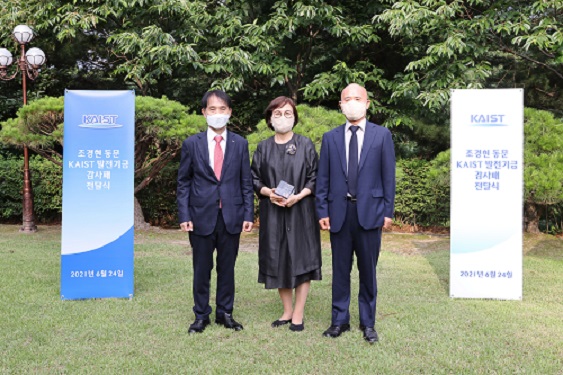 Alumni Professor Cho at NYU Endows Scholarship for Female Computer Scientists
Alumni Professor Kyunghyun Cho at New York University endowed the “Lim Mi-Sook Scholarship” at KAIST for female computer scientists in honor of his mother.
Professor Cho, a graduate of the School of Computing in 2011 completed his master’s and PhD at Alto University in Finland in 2014. He has been teaching at NYU since 2015 and received the Samsung Ho-Am Prize for Engineering this year in recognition of his outstanding researches in the fields of machine learning and AI.
“I hope this will encourage young female students to continue their studies in computer science and encourage others to join the discipline in the future, thereby contributing to building a more diverse community of computer scientists,” he said in his written message. His parents and President Kwang Hyung Lee attended the donation ceremony held at the Daejeon campus on June 24.
Professor Cho has developed neural network machine learning translation algorithm that is widely being used in translation engines. His contributions to AI-powered translations and innovation in the industry led him to win one of the most prestigious prizes in Korea.
He decided to donate his 300 million KRW prize money to fund two 100 million KRW scholarships named after each of his parents: the Lim Mi-Sook Scholarship is for female computer scientists and the Bae-Gyu Scholarly Award for Classics is in honor of his father, who is a Korean literature professor at Soongsil University in Korea. He will also fund a scholarship at Alto University.
“I recall there were less than five female students out of 70 students in my cohort during my undergraduate studies at KAIST even in later 2000s. Back then, it just felt natural that boys majored computer science and girls in biology.”
He said he wanted to acknowledge his mother, who had to give up her teaching career in the 1980s to take care of her children. “It made all of us think more about the burden of raising children that is placed often disproportionately on mothers and how it should be better distributed among parents, relatives, and society in order to ensure and maximize equity in education as well as career development and advances.”
He added, “As a small step to help build a more diverse environment, I have decided to donate to this fund to provide a small supplement to the small group of female students majoring in computer science.
2021.07.01 View 10598
Alumni Professor Cho at NYU Endows Scholarship for Female Computer Scientists
Alumni Professor Kyunghyun Cho at New York University endowed the “Lim Mi-Sook Scholarship” at KAIST for female computer scientists in honor of his mother.
Professor Cho, a graduate of the School of Computing in 2011 completed his master’s and PhD at Alto University in Finland in 2014. He has been teaching at NYU since 2015 and received the Samsung Ho-Am Prize for Engineering this year in recognition of his outstanding researches in the fields of machine learning and AI.
“I hope this will encourage young female students to continue their studies in computer science and encourage others to join the discipline in the future, thereby contributing to building a more diverse community of computer scientists,” he said in his written message. His parents and President Kwang Hyung Lee attended the donation ceremony held at the Daejeon campus on June 24.
Professor Cho has developed neural network machine learning translation algorithm that is widely being used in translation engines. His contributions to AI-powered translations and innovation in the industry led him to win one of the most prestigious prizes in Korea.
He decided to donate his 300 million KRW prize money to fund two 100 million KRW scholarships named after each of his parents: the Lim Mi-Sook Scholarship is for female computer scientists and the Bae-Gyu Scholarly Award for Classics is in honor of his father, who is a Korean literature professor at Soongsil University in Korea. He will also fund a scholarship at Alto University.
“I recall there were less than five female students out of 70 students in my cohort during my undergraduate studies at KAIST even in later 2000s. Back then, it just felt natural that boys majored computer science and girls in biology.”
He said he wanted to acknowledge his mother, who had to give up her teaching career in the 1980s to take care of her children. “It made all of us think more about the burden of raising children that is placed often disproportionately on mothers and how it should be better distributed among parents, relatives, and society in order to ensure and maximize equity in education as well as career development and advances.”
He added, “As a small step to help build a more diverse environment, I have decided to donate to this fund to provide a small supplement to the small group of female students majoring in computer science.
2021.07.01 View 10598 -
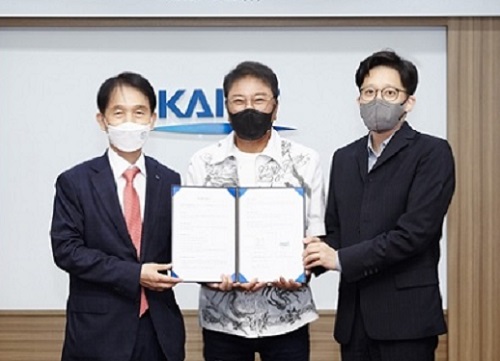 KAIST-SM Entertainment Joint Research for Metaverse
“Culture scientist will play a role in the future of the entertainment industry”
KAIST President Kwang Hyung Lee and SM Entertainment Founder and Chief Executive Producer Soo-Man Lee signed an MOU on joint research of the metaverse on June 23 at the Daejeon campus. SM Entertainment is the powerhouse of K-pop and Lee is a pioneering figure who helped Korean pop culture emerge into a global phenomenon.
The KAIST-SM metaverse partnership will bring out new culture technology that will lead the virtual entertainment industry by creating more dynamic and vivid digital technologies. KAIST will utilize its AI, robot, and network technologies, while SM will provide its content production expertise for this metaverse research.
President Lee said, “SM artists have mesmerized global audiences and opened new markets for K-Pop. Combining the creativity and cultural imagination of SM with technologies from KAIST, together we will make significant contributions to the advancement of virtual reality as well as the global entertainment industry.”
The Graduate School of Culture Technology has been engaging in a variety of creative projects incorporating science and technology for decades and will now actively participate in this metaverse project with SM.
CEP Lee explained, “The power of celebrities and avatars will rule the future entertainment industry. SM will make a leap forward to be a ‘first mover’ in the digital entertainment industry with this partnership with KAIST. This partnership will shape the new digital future of the entertainment industry boosted by cutting-edge technologies.”
CEP Lee also delivered a special lecture for the KAIST community via Zoom. Saying that producers in the future will be ‘culture scientists’, he stressed the importance of technology converging with culture.
“The key factor for K-pop’s success lies in the impressive technology of Korea. SM places a high priority on developing cultural technology and creating new artists and products combining this technology,” added Lee, citing the hologram contents of Beyond Live concerts and the new 4+4 girl group composed of four girls and four avatars called ‘Aespa.’
2021.06.25 View 8302
KAIST-SM Entertainment Joint Research for Metaverse
“Culture scientist will play a role in the future of the entertainment industry”
KAIST President Kwang Hyung Lee and SM Entertainment Founder and Chief Executive Producer Soo-Man Lee signed an MOU on joint research of the metaverse on June 23 at the Daejeon campus. SM Entertainment is the powerhouse of K-pop and Lee is a pioneering figure who helped Korean pop culture emerge into a global phenomenon.
The KAIST-SM metaverse partnership will bring out new culture technology that will lead the virtual entertainment industry by creating more dynamic and vivid digital technologies. KAIST will utilize its AI, robot, and network technologies, while SM will provide its content production expertise for this metaverse research.
President Lee said, “SM artists have mesmerized global audiences and opened new markets for K-Pop. Combining the creativity and cultural imagination of SM with technologies from KAIST, together we will make significant contributions to the advancement of virtual reality as well as the global entertainment industry.”
The Graduate School of Culture Technology has been engaging in a variety of creative projects incorporating science and technology for decades and will now actively participate in this metaverse project with SM.
CEP Lee explained, “The power of celebrities and avatars will rule the future entertainment industry. SM will make a leap forward to be a ‘first mover’ in the digital entertainment industry with this partnership with KAIST. This partnership will shape the new digital future of the entertainment industry boosted by cutting-edge technologies.”
CEP Lee also delivered a special lecture for the KAIST community via Zoom. Saying that producers in the future will be ‘culture scientists’, he stressed the importance of technology converging with culture.
“The key factor for K-pop’s success lies in the impressive technology of Korea. SM places a high priority on developing cultural technology and creating new artists and products combining this technology,” added Lee, citing the hologram contents of Beyond Live concerts and the new 4+4 girl group composed of four girls and four avatars called ‘Aespa.’
2021.06.25 View 8302 -
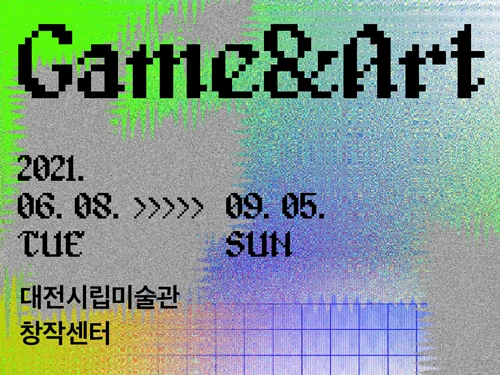 ‘Game&Art: Auguries of Fantasy’ Features Future of the Metaverse
‘Game & Art: Auguries of Fantasy,’ a special exhibition combining art and technology will feature the new future of metaverse fantasy. The show will be hosted at the Daejeon Creative Center at the Daejeon Museum of Art through September 5.
This show exhibits a combination of science and technology with culture and arts, and introduces young artists whose creativity will lead to new opportunities in games and art. The Graduate School of Culture Technology was designated as a leading culture content academy in 2020 by the Ministry of Culture, Sports & Tourism and the Korea Creative Content Agency for fostering the R&D workforce in creative culture technology.
NCsoft sponsored the show and also participated as an artist. It combined its game-composing elements and technologies with other genres, including data for game construction, scenarios for forming a worldview, and game art and sound. All of the contents can be experienced online in a virtual space as well as offline, and can be easily accessed through personal devices.
Characterized by the themes ‘timeless’ and ‘spaceless’ which connect the past, present, and future, and space created in the digital world. The exhibition gives audience members an opportunity to experience freedom beyond the constraints of time and space under the theme of a fantasy reality created by games and art.
"Computer games, which began in the 1980s, have become cultural content that spans generations, and games are now the fusion field for leading-edge technologies including computer graphics, sound, human-computer interactions, big data, and AI. They are also the best platform for artistic creativity by adding human imagination to technology," said Professor Joo-Han Nam from the Graduate School of Culture Technology, who led the project.
"Our artists wanted to convey various messages to our society through works that connect the past, present, and future through games."
Ju-young Oh's "Unexpected Scenery V2" and "Hope for Rats V2" display game-type media work that raises issues surrounding technology, such as the lack of understanding behind various scientific achievements, the history of accidental achievements, and the side effects of new conveniences.
Tae-Wan Kim, in his work themed ‘healing’ combined the real-time movement of particles which follows the movements of people recorded as digital data. Metadata is collected by sensors in the exhibition space, and floating particle forms are evolved into abstract graphic designs according to audio-visual responses.
Meanwhile, ‘SOS’ is a collaboration work from six KAIST researchers (In-Hwa Yeom, Seung-Eon Lee, Seong-Jin Jeon, Jin-Seok Hong, Hyung-Seok Yoon, and Sang-Min Lee). SOS is based on diverse perspectives embracing phenomena surrounding contemporary natural resources. Audience members follow a gamified path between the various media-elements composing the art’s environment. Through this process, the audience can experience various emotions such as curiosity, suspicion, and recovery.
‘Diversity’ by Sung-Hyun Kim uses devices that recognize the movements of hands and fingers to provide experiences exploring the latent space of game play images learned by deep neural networks. Image volumes generated by neural networks are visualized through physics-based, three-dimensional, volume-rendering algorithms, and a series of processes were implemented based on the self-written code.
2021.06.21 View 10836
‘Game&Art: Auguries of Fantasy’ Features Future of the Metaverse
‘Game & Art: Auguries of Fantasy,’ a special exhibition combining art and technology will feature the new future of metaverse fantasy. The show will be hosted at the Daejeon Creative Center at the Daejeon Museum of Art through September 5.
This show exhibits a combination of science and technology with culture and arts, and introduces young artists whose creativity will lead to new opportunities in games and art. The Graduate School of Culture Technology was designated as a leading culture content academy in 2020 by the Ministry of Culture, Sports & Tourism and the Korea Creative Content Agency for fostering the R&D workforce in creative culture technology.
NCsoft sponsored the show and also participated as an artist. It combined its game-composing elements and technologies with other genres, including data for game construction, scenarios for forming a worldview, and game art and sound. All of the contents can be experienced online in a virtual space as well as offline, and can be easily accessed through personal devices.
Characterized by the themes ‘timeless’ and ‘spaceless’ which connect the past, present, and future, and space created in the digital world. The exhibition gives audience members an opportunity to experience freedom beyond the constraints of time and space under the theme of a fantasy reality created by games and art.
"Computer games, which began in the 1980s, have become cultural content that spans generations, and games are now the fusion field for leading-edge technologies including computer graphics, sound, human-computer interactions, big data, and AI. They are also the best platform for artistic creativity by adding human imagination to technology," said Professor Joo-Han Nam from the Graduate School of Culture Technology, who led the project.
"Our artists wanted to convey various messages to our society through works that connect the past, present, and future through games."
Ju-young Oh's "Unexpected Scenery V2" and "Hope for Rats V2" display game-type media work that raises issues surrounding technology, such as the lack of understanding behind various scientific achievements, the history of accidental achievements, and the side effects of new conveniences.
Tae-Wan Kim, in his work themed ‘healing’ combined the real-time movement of particles which follows the movements of people recorded as digital data. Metadata is collected by sensors in the exhibition space, and floating particle forms are evolved into abstract graphic designs according to audio-visual responses.
Meanwhile, ‘SOS’ is a collaboration work from six KAIST researchers (In-Hwa Yeom, Seung-Eon Lee, Seong-Jin Jeon, Jin-Seok Hong, Hyung-Seok Yoon, and Sang-Min Lee). SOS is based on diverse perspectives embracing phenomena surrounding contemporary natural resources. Audience members follow a gamified path between the various media-elements composing the art’s environment. Through this process, the audience can experience various emotions such as curiosity, suspicion, and recovery.
‘Diversity’ by Sung-Hyun Kim uses devices that recognize the movements of hands and fingers to provide experiences exploring the latent space of game play images learned by deep neural networks. Image volumes generated by neural networks are visualized through physics-based, three-dimensional, volume-rendering algorithms, and a series of processes were implemented based on the self-written code.
2021.06.21 View 10836 -
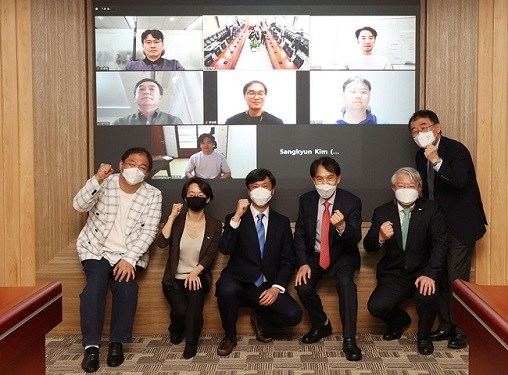 Krafton Matches Alumni Donations to Raise 11 Billion KRW for SW Developers
Alumni donations from the School of Computing, including Baemin and Devsisters, continue to grow
Alumni from the KAIST School of Computing who are current and former developers at the leading game company Krafton, established by KAIST alumna Byung-Gyu Chang, made an agreement to help raise 11 billion KRW during a ceremony on June 4. The funds raised in the matching grant will be used to nurture software developers.
Krafton Chairman Chang donated 10 billion won last January. His donation inspired other alumni working at Krafton as well as its former developers. Eleven KAIST alumni raised 5.5 billion KRW in two months and discussed the matching grant idea with Chairman Chang.
The Krafton matching grant ceremony was attended by President Kwang Hyung Lee, Provost and Executive Vice President Seung Seob Lee, Vice President for Research Sang Yup Lee, Head of the School of Computing Sukyoung Ryu, Krafton Chairman Byung-gyu Chang, and KAIST alumnus from Krafton Seung-woo Shin. Other alumni donors including Krafton CEO Changhan Kim joined the ceremony online.
Krafton CEO Changhan Kim said, “Just as our alma mater played an important role in growing our company, we hope that our donation could help support good developers. This will not only help our company, but advance our industry.”
KAIST and Krafton also signed a business agreement to foster competitive developers. Krafton said it plans to continue giving back to society through the matching grant program.
Head of the School of Computing Sukyoung Ryu thanked Chairman Chang and alumni who took part in the fund raising, saying, “To take the lead in rapidly changing computer technology, we desperately need more top students, faculty members, and facilities. We need more resources and infrastructure for interdisciplinary research.”
The School of Computing has seen significant growth recently. Its number of undergraduate students has increased from 450 in 2016 to more than 900 in 2021. With this donation, the school will expand its current buildings to provide diverse educational and mentoring programs in more spacious facilities.
Seung-woo Shin (Class of ’92), who joined Krafton’s matching grant, said, “I have always been thankful for the people I met and what I learned at KAIST. I was moved by the idea of giving back to the school.”
Seong-jung Ryu (Class of ’97) said, “This donation reminded me of the good times I had back then. I thought it was crucial that the department’s facilities be extended, so I naturally wanted to take part.”
Alumni donations, especially from the School of Computing, have also continued to grow more recently. Woowa Brothers Corp. CEO Beom-Jun Kim, the developer of the meal delivery app ‘Baemin’ donated 100 million KRW in April. Baemin became the most used app in the country during the COVID-19 pandemic.
He explained, “I have been thinking about ways to give something to the next generation, rather than ‘paying back’ those who helped me in the past.”
Encouraged by Baemin’s donation, alumni couple Ha-Yeon Seo and Dong-Hun Hahn from the School of Computing and eleven alumni engineers working at Devsisters Corp. also followed suit.
2021.06.09 View 12184
Krafton Matches Alumni Donations to Raise 11 Billion KRW for SW Developers
Alumni donations from the School of Computing, including Baemin and Devsisters, continue to grow
Alumni from the KAIST School of Computing who are current and former developers at the leading game company Krafton, established by KAIST alumna Byung-Gyu Chang, made an agreement to help raise 11 billion KRW during a ceremony on June 4. The funds raised in the matching grant will be used to nurture software developers.
Krafton Chairman Chang donated 10 billion won last January. His donation inspired other alumni working at Krafton as well as its former developers. Eleven KAIST alumni raised 5.5 billion KRW in two months and discussed the matching grant idea with Chairman Chang.
The Krafton matching grant ceremony was attended by President Kwang Hyung Lee, Provost and Executive Vice President Seung Seob Lee, Vice President for Research Sang Yup Lee, Head of the School of Computing Sukyoung Ryu, Krafton Chairman Byung-gyu Chang, and KAIST alumnus from Krafton Seung-woo Shin. Other alumni donors including Krafton CEO Changhan Kim joined the ceremony online.
Krafton CEO Changhan Kim said, “Just as our alma mater played an important role in growing our company, we hope that our donation could help support good developers. This will not only help our company, but advance our industry.”
KAIST and Krafton also signed a business agreement to foster competitive developers. Krafton said it plans to continue giving back to society through the matching grant program.
Head of the School of Computing Sukyoung Ryu thanked Chairman Chang and alumni who took part in the fund raising, saying, “To take the lead in rapidly changing computer technology, we desperately need more top students, faculty members, and facilities. We need more resources and infrastructure for interdisciplinary research.”
The School of Computing has seen significant growth recently. Its number of undergraduate students has increased from 450 in 2016 to more than 900 in 2021. With this donation, the school will expand its current buildings to provide diverse educational and mentoring programs in more spacious facilities.
Seung-woo Shin (Class of ’92), who joined Krafton’s matching grant, said, “I have always been thankful for the people I met and what I learned at KAIST. I was moved by the idea of giving back to the school.”
Seong-jung Ryu (Class of ’97) said, “This donation reminded me of the good times I had back then. I thought it was crucial that the department’s facilities be extended, so I naturally wanted to take part.”
Alumni donations, especially from the School of Computing, have also continued to grow more recently. Woowa Brothers Corp. CEO Beom-Jun Kim, the developer of the meal delivery app ‘Baemin’ donated 100 million KRW in April. Baemin became the most used app in the country during the COVID-19 pandemic.
He explained, “I have been thinking about ways to give something to the next generation, rather than ‘paying back’ those who helped me in the past.”
Encouraged by Baemin’s donation, alumni couple Ha-Yeon Seo and Dong-Hun Hahn from the School of Computing and eleven alumni engineers working at Devsisters Corp. also followed suit.
2021.06.09 View 12184 -
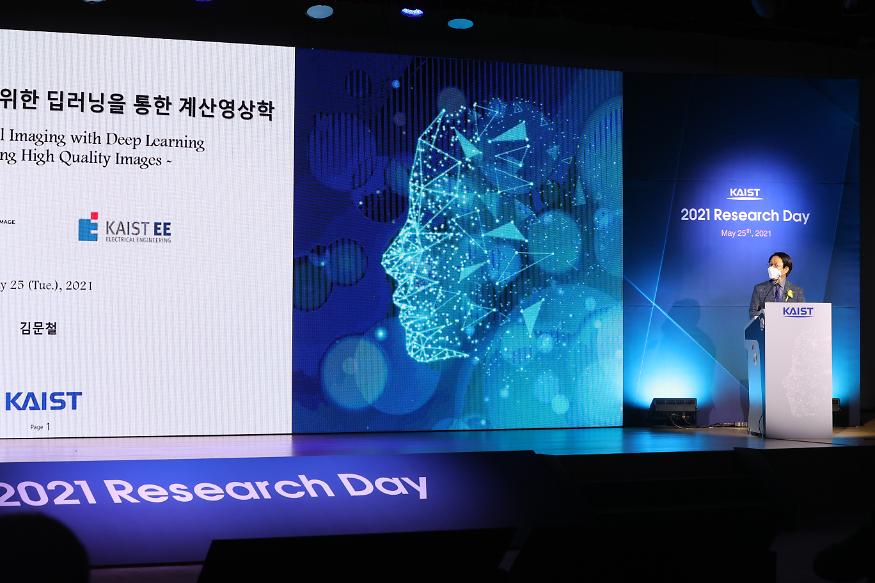 Research Day Highlights the Most Impactful Technologies of the Year
Technology Converting Full HD Image to 4-Times Higher UHD Via Deep Learning Cited as the Research of the Year
The technology converting a full HD image into a four-times higher UHD image in real time via AI deep learning was recognized as the Research of the Year. Professor Munchurl Kim from the School of Electrical Engineering who developed the technology won the Research of the Year Grand Prize during the 2021 KAIST Research Day ceremony on May 25. Professor Kim was lauded for conducting creative research on machine learning and deep learning-based image processing.
KAIST’s Research Day recognizes the most notable research outcomes of the year, while creating opportunities for researchers to immerse themselves into interdisciplinary research projects with their peers. The ceremony was broadcast online due to Covid-19 and announced the Ten R&D Achievement of the Year that are expected to make a significant impact.
To celebrate the award, Professor Kim gave a lecture on “Computational Imaging through Deep Learning for the Acquisition of High-Quality Images.” Focusing on the fact that advancements in artificial intelligence technology can show superior performance when used to convert low-quality videos to higher quality, he introduced some of the AI technologies that are currently being applied in the field of image restoration and quality improvement.
Professors Eui-Cheol Shin from the Graduate School of Medical Science and Engineering and In-Cheol Park from the School of Electrical Engineering each received Research Awards, and Professor Junyong Noh from the Graduate School of Culture Technology was selected for the Innovation Award. Professors Dong Ki Yoon from the Department of Chemistry and Hyungki Kim from the Department of Mechanical Engineering were awarded the Interdisciplinary Award as a team for their joint research.
Meanwhile, out of KAIST’s ten most notable R&D achievements, those from the field of natural and biological sciences included research on rare earth element-platinum nanoparticle catalysts by Professor Ryong Ryoo from the Department of Chemistry, real-time observations of the locational changes in all of the atoms in a molecule by Professor Hyotcherl Ihee from the Department of Chemistry, and an investigation on memory retention mechanisms after synapse removal from an astrocyte by Professor Won-Suk Chung from the Department of Biological Sciences.
Awardees from the engineering field were a wearable robot for paraplegics with the world’s best functionality and walking speed by Professor Kyoungchul Kong from the Department of Mechanical Engineering, fair machine learning by Professor Changho Suh from the School of Electrical Engineering, and a generative adversarial networks processing unit (GANPU), an AI semiconductor that can learn from even mobiles by processing multiple and deep networks by Professor Hoi-Jun Yoo from the School of Electrical Engineering.
Others selected as part of the ten research studies were the development of epigenetic reprogramming technology in tumour by Professor Pilnam Kim from the Department of Bio and Brain Engineering, the development of an original technology for reverse cell aging by Professor Kwang-Hyun Cho from the Department of Bio and Brain Engineering, a heterogeneous metal element catalyst for atmospheric purification by Professor Hyunjoo Lee from the Department of Chemical and Biomolecular Engineering, and the Mobile Clinic Module (MCM): a negative pressure ward for epidemic hospitals by Professor Taek-jin Nam (reported at the Wall Street Journal) from the Department of Industrial Design.
2021.05.31 View 16889
Research Day Highlights the Most Impactful Technologies of the Year
Technology Converting Full HD Image to 4-Times Higher UHD Via Deep Learning Cited as the Research of the Year
The technology converting a full HD image into a four-times higher UHD image in real time via AI deep learning was recognized as the Research of the Year. Professor Munchurl Kim from the School of Electrical Engineering who developed the technology won the Research of the Year Grand Prize during the 2021 KAIST Research Day ceremony on May 25. Professor Kim was lauded for conducting creative research on machine learning and deep learning-based image processing.
KAIST’s Research Day recognizes the most notable research outcomes of the year, while creating opportunities for researchers to immerse themselves into interdisciplinary research projects with their peers. The ceremony was broadcast online due to Covid-19 and announced the Ten R&D Achievement of the Year that are expected to make a significant impact.
To celebrate the award, Professor Kim gave a lecture on “Computational Imaging through Deep Learning for the Acquisition of High-Quality Images.” Focusing on the fact that advancements in artificial intelligence technology can show superior performance when used to convert low-quality videos to higher quality, he introduced some of the AI technologies that are currently being applied in the field of image restoration and quality improvement.
Professors Eui-Cheol Shin from the Graduate School of Medical Science and Engineering and In-Cheol Park from the School of Electrical Engineering each received Research Awards, and Professor Junyong Noh from the Graduate School of Culture Technology was selected for the Innovation Award. Professors Dong Ki Yoon from the Department of Chemistry and Hyungki Kim from the Department of Mechanical Engineering were awarded the Interdisciplinary Award as a team for their joint research.
Meanwhile, out of KAIST’s ten most notable R&D achievements, those from the field of natural and biological sciences included research on rare earth element-platinum nanoparticle catalysts by Professor Ryong Ryoo from the Department of Chemistry, real-time observations of the locational changes in all of the atoms in a molecule by Professor Hyotcherl Ihee from the Department of Chemistry, and an investigation on memory retention mechanisms after synapse removal from an astrocyte by Professor Won-Suk Chung from the Department of Biological Sciences.
Awardees from the engineering field were a wearable robot for paraplegics with the world’s best functionality and walking speed by Professor Kyoungchul Kong from the Department of Mechanical Engineering, fair machine learning by Professor Changho Suh from the School of Electrical Engineering, and a generative adversarial networks processing unit (GANPU), an AI semiconductor that can learn from even mobiles by processing multiple and deep networks by Professor Hoi-Jun Yoo from the School of Electrical Engineering.
Others selected as part of the ten research studies were the development of epigenetic reprogramming technology in tumour by Professor Pilnam Kim from the Department of Bio and Brain Engineering, the development of an original technology for reverse cell aging by Professor Kwang-Hyun Cho from the Department of Bio and Brain Engineering, a heterogeneous metal element catalyst for atmospheric purification by Professor Hyunjoo Lee from the Department of Chemical and Biomolecular Engineering, and the Mobile Clinic Module (MCM): a negative pressure ward for epidemic hospitals by Professor Taek-jin Nam (reported at the Wall Street Journal) from the Department of Industrial Design.
2021.05.31 View 16889 -
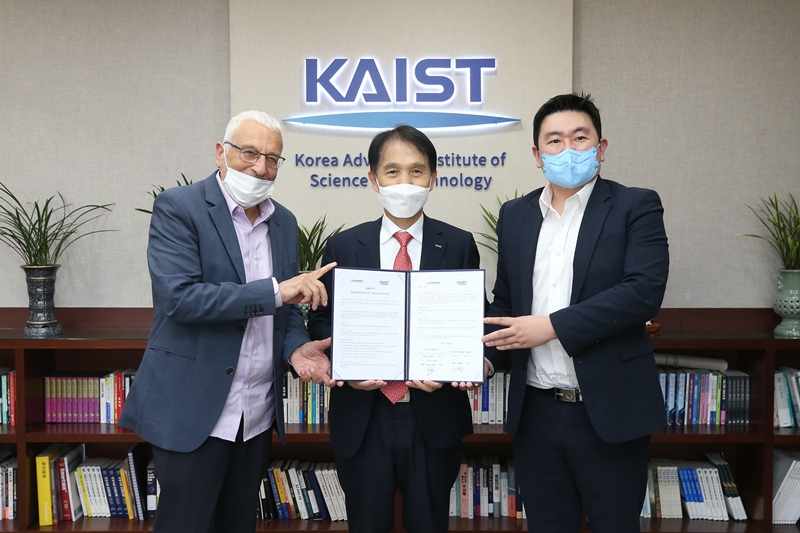 KAIST Teams Up with Yozma Group to Nurture Startups
KAIST has joined hands with Israeli venture capital investor Yozma Group to help campus-based startups grow and build success. The two signed a memorandum of understanding (MOU) on joint technology value creation initiatives at the signing ceremony that was held at KAIST’s main campus in Daejeon on April 8.
Under the MOU, Yozma Group will make investments and implement acceleration programs for startups established by KAIST professors, graduates, and students, as well as those invested in by the university.
Yozma Group already launched a $70 million fund to help grow companies in Korea and Israel. Yozma Group will use the fund as well as its global acceleration know-how and network of over 400 R&D centers across Israel to help promising KAIST startups enter overseas markets.
Moreover, Yozma Group also plans to discover and support KAIST startups that need technology from the Weizmann Institute of Science, Israel’s leading multidisciplinary basic research institution in natural and exact sciences.
KAIST is also in talks to locate Yozma Group’s branch office on the university’s campus to ensure seamless collaborations.
KAIST President Kwang Hyung Lee explained to Yozma Group’s Founder and Chairman Yigal Erlich and Head of Asia Pacific Won-Jae Lee at the MOU signing ceremony that “startup and technology commercialization are the crucial areas where KAIST will make innovations.”
“Cooperation with Yozma Group will help KAIST startups transform their ideas and technologies into real businesses and build a global presence,” he added.
Yozma Group started as Yozma Fund, created in conjunction with the Israeli government in 1993 to support the globalization of Israeli startups and to foster the growth of Israel’s venture capital industry. The Fund, which was privatized in 1998, has supported 97 Israeli tech ventures joining the Nasdaq, leading Israel to become a global innovation hub that has the third-most companies listed on the Nasdaq.
(END)
2021.04.20 View 8497
KAIST Teams Up with Yozma Group to Nurture Startups
KAIST has joined hands with Israeli venture capital investor Yozma Group to help campus-based startups grow and build success. The two signed a memorandum of understanding (MOU) on joint technology value creation initiatives at the signing ceremony that was held at KAIST’s main campus in Daejeon on April 8.
Under the MOU, Yozma Group will make investments and implement acceleration programs for startups established by KAIST professors, graduates, and students, as well as those invested in by the university.
Yozma Group already launched a $70 million fund to help grow companies in Korea and Israel. Yozma Group will use the fund as well as its global acceleration know-how and network of over 400 R&D centers across Israel to help promising KAIST startups enter overseas markets.
Moreover, Yozma Group also plans to discover and support KAIST startups that need technology from the Weizmann Institute of Science, Israel’s leading multidisciplinary basic research institution in natural and exact sciences.
KAIST is also in talks to locate Yozma Group’s branch office on the university’s campus to ensure seamless collaborations.
KAIST President Kwang Hyung Lee explained to Yozma Group’s Founder and Chairman Yigal Erlich and Head of Asia Pacific Won-Jae Lee at the MOU signing ceremony that “startup and technology commercialization are the crucial areas where KAIST will make innovations.”
“Cooperation with Yozma Group will help KAIST startups transform their ideas and technologies into real businesses and build a global presence,” he added.
Yozma Group started as Yozma Fund, created in conjunction with the Israeli government in 1993 to support the globalization of Israeli startups and to foster the growth of Israel’s venture capital industry. The Fund, which was privatized in 1998, has supported 97 Israeli tech ventures joining the Nasdaq, leading Israel to become a global innovation hub that has the third-most companies listed on the Nasdaq.
(END)
2021.04.20 View 8497 -
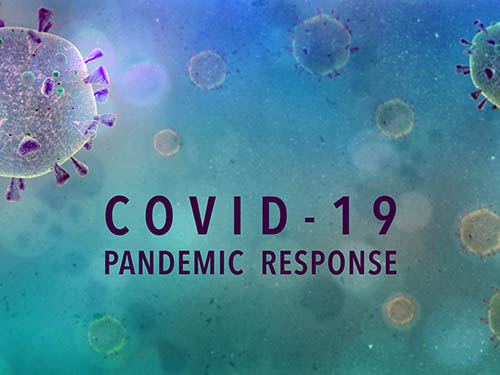 COVID-Update: KAIST on High Alert amid Spring Resurgence
COVID-19 Task Force responds 24-7 and ISSS provides returning international students with a comfort package during 14-day mandatory quarantine
In response to the upsurge of COVID-19 cases in the proximate college districts in Daejeon, KAIST announced the enforcement of stricter health and safety regulations. Korean health authorities expected another surge of COVID-19 cases this spring as Korea’s daily new COVID-19 cases have rebounded to the high 600s and over 700 in April, which is the most in over three months.
New guidelines issued on April 5 banned faculty, staff, and students from engaging in off-campus activities and utilizing external public facilities. Such facilities include, but are not limited to, bars, cafes, clubs, gyms, karaoke rooms, PC rooms, restaurants, and other crowded indoor spaces. All class and research activities, work meetings, and school events were moved exclusively online, and working from home and flexible working hours were highly encouraged in order to minimize face-to-face interactions on campus. In particular, having meals outside of KAIST cafeterias in groups of two or more was prohibited, while food delivery and take-outs were allowed.
Executive Vice President and Provost Seung Seob Lee said in a letter to the KAIST community on April 5 that “the school considers the risk of the current situation to be very high, likely the highest since the outbreak of COVID-19.” Provost Lee then called for more team efforts to contain the current phase of the pandemic and asked everyone to do their part.
The school installed new temperature scanners equipped with hand sanitizer dispensers in front of the dormitory entrances to further control the spread of the disease on campus, following confirmed COVID-19 cases among dormitory residents.
As the COVID-19 pandemic continues with no clear end in sight, the Task Force for the Prevention of COVID-19 and the International Scholar and Student Services (ISSS) Team at KAIST are working around the clock to reduce the risk of infection spread not only within the campus, but also coming from outside the campus.
Under strict health and safety guidelines, KAIST has allowed international students to come back to campus. Currently about 600 international students, mostly graduate students reside on campus. All returning students should complete the mandatory 14-day self-quarantine required by the Korean government at their own expense.
The KAIST COVID-19 Task Force is in charge of enacting on-campus health and safety guidelines, responding to reports and inquiries from the KAIST community 24-7, and controlling outsider access, among other responsibilities.
The ISSS Team requires returning international students to fill out an entry authorization form and receive approval from the KAIST COVID-19 Task Force prior to returning to campus from their home countries. Once students arrive at their designated quarantine facility, the KAIST ISSS Team sends care packages, which includes some toiletries, instant food, a multipot, a thermometer, and other daily necessities. During the quarantine period, returning students are also advised to follow the directions given by government officials and to coordinate with the ISSS Team. The team also provides useful Korean phrases for international students to help them with communication.
The self-quarantine period ends at 12 p.m. 14 days after arrival. Within two days of finishing the 14 days of self-isolation, these students are required to undergo a polymerase chain reaction (PCR) test for COVID-19 at the nearest health center. After confirmed negative, they are allowed to move into on-campus accommodations. KAIST will maintain the current method of remote education and distancing methods until further notice.
(END)
2021.04.16 View 11484
COVID-Update: KAIST on High Alert amid Spring Resurgence
COVID-19 Task Force responds 24-7 and ISSS provides returning international students with a comfort package during 14-day mandatory quarantine
In response to the upsurge of COVID-19 cases in the proximate college districts in Daejeon, KAIST announced the enforcement of stricter health and safety regulations. Korean health authorities expected another surge of COVID-19 cases this spring as Korea’s daily new COVID-19 cases have rebounded to the high 600s and over 700 in April, which is the most in over three months.
New guidelines issued on April 5 banned faculty, staff, and students from engaging in off-campus activities and utilizing external public facilities. Such facilities include, but are not limited to, bars, cafes, clubs, gyms, karaoke rooms, PC rooms, restaurants, and other crowded indoor spaces. All class and research activities, work meetings, and school events were moved exclusively online, and working from home and flexible working hours were highly encouraged in order to minimize face-to-face interactions on campus. In particular, having meals outside of KAIST cafeterias in groups of two or more was prohibited, while food delivery and take-outs were allowed.
Executive Vice President and Provost Seung Seob Lee said in a letter to the KAIST community on April 5 that “the school considers the risk of the current situation to be very high, likely the highest since the outbreak of COVID-19.” Provost Lee then called for more team efforts to contain the current phase of the pandemic and asked everyone to do their part.
The school installed new temperature scanners equipped with hand sanitizer dispensers in front of the dormitory entrances to further control the spread of the disease on campus, following confirmed COVID-19 cases among dormitory residents.
As the COVID-19 pandemic continues with no clear end in sight, the Task Force for the Prevention of COVID-19 and the International Scholar and Student Services (ISSS) Team at KAIST are working around the clock to reduce the risk of infection spread not only within the campus, but also coming from outside the campus.
Under strict health and safety guidelines, KAIST has allowed international students to come back to campus. Currently about 600 international students, mostly graduate students reside on campus. All returning students should complete the mandatory 14-day self-quarantine required by the Korean government at their own expense.
The KAIST COVID-19 Task Force is in charge of enacting on-campus health and safety guidelines, responding to reports and inquiries from the KAIST community 24-7, and controlling outsider access, among other responsibilities.
The ISSS Team requires returning international students to fill out an entry authorization form and receive approval from the KAIST COVID-19 Task Force prior to returning to campus from their home countries. Once students arrive at their designated quarantine facility, the KAIST ISSS Team sends care packages, which includes some toiletries, instant food, a multipot, a thermometer, and other daily necessities. During the quarantine period, returning students are also advised to follow the directions given by government officials and to coordinate with the ISSS Team. The team also provides useful Korean phrases for international students to help them with communication.
The self-quarantine period ends at 12 p.m. 14 days after arrival. Within two days of finishing the 14 days of self-isolation, these students are required to undergo a polymerase chain reaction (PCR) test for COVID-19 at the nearest health center. After confirmed negative, they are allowed to move into on-campus accommodations. KAIST will maintain the current method of remote education and distancing methods until further notice.
(END)
2021.04.16 View 11484 -
 Professor Jihee Kim Wins the Lucas Prize for Her Income Inequality Theory
Professor Jihee Kim from the School of Business and Technology Management at KAIST was announced as one of two winners of the 2021 Robert E. Lucas Jr. Prize. Professor Kim was recognized for having provided an empirical analysis on engines of income growth, sources of income inequality, and their rich interplay in her paper published in the Journal of Political Economy (JPE) in October 2018. The co-author of this study, Professor Charles I. Jones at Stanford University, was honored to be another awardee of this year’s Lucas Prize.
The Robert E. Lucas Jr. Prize, simply known as the Lucas Prize, is awarded biannually for the most interesting paper in the area of Dynamic Economics published in the leading economics journal JPE in the preceding two years. The prize was established in 2016 in celebration of the 1995 Nobel Prize in Economics Laureate Dr. Lucas’s seminal contributions to economics. The two former prizes were presented in 2019 and 2017 respectively.
Professor Kim and Professor Jones, in their award-winning paper titled 'A Schumpeterian Model of Top Income Inequality', observed that top income inequality was relatively low and stable between 1960 and 1980, but then rose sharply in some countries, including the United States and the United Kingdom.
The authors focused on entrepreneurial activities and the resulting income as the driving force of income inequality. They assumed that the forces that increased the efforts of fast-growing entrepreneurs to improve their products or increased productivity of their efforts could increase income inequality. On the other hand, the forces that enhanced creative destruction or that raised the rate at which high-growth entrepreneurs lost that status could decrease income inequality, according to the authors’ theory.
Professor Kim explained, “Various economic forces due to globalization, the advancement in AI and IT technologies, taxes, and policies related to innovation blocking may explain the varied patterns in income inequality.”
“Through follow-up research, I will continue developing economic theory models that can analyze the impact of changes such as income tax rates and salary negotiations on income inequality,” she added.
Professor Kim received her bachelor’s degree from the KAIST School of Computing in 2005 and pursued her graduates studies at Stanford University, acquiring a master’s degree in economics in 2011 and a doctoral degree in management science and engineering in 2013.
(END)
2021.03.26 View 9142
Professor Jihee Kim Wins the Lucas Prize for Her Income Inequality Theory
Professor Jihee Kim from the School of Business and Technology Management at KAIST was announced as one of two winners of the 2021 Robert E. Lucas Jr. Prize. Professor Kim was recognized for having provided an empirical analysis on engines of income growth, sources of income inequality, and their rich interplay in her paper published in the Journal of Political Economy (JPE) in October 2018. The co-author of this study, Professor Charles I. Jones at Stanford University, was honored to be another awardee of this year’s Lucas Prize.
The Robert E. Lucas Jr. Prize, simply known as the Lucas Prize, is awarded biannually for the most interesting paper in the area of Dynamic Economics published in the leading economics journal JPE in the preceding two years. The prize was established in 2016 in celebration of the 1995 Nobel Prize in Economics Laureate Dr. Lucas’s seminal contributions to economics. The two former prizes were presented in 2019 and 2017 respectively.
Professor Kim and Professor Jones, in their award-winning paper titled 'A Schumpeterian Model of Top Income Inequality', observed that top income inequality was relatively low and stable between 1960 and 1980, but then rose sharply in some countries, including the United States and the United Kingdom.
The authors focused on entrepreneurial activities and the resulting income as the driving force of income inequality. They assumed that the forces that increased the efforts of fast-growing entrepreneurs to improve their products or increased productivity of their efforts could increase income inequality. On the other hand, the forces that enhanced creative destruction or that raised the rate at which high-growth entrepreneurs lost that status could decrease income inequality, according to the authors’ theory.
Professor Kim explained, “Various economic forces due to globalization, the advancement in AI and IT technologies, taxes, and policies related to innovation blocking may explain the varied patterns in income inequality.”
“Through follow-up research, I will continue developing economic theory models that can analyze the impact of changes such as income tax rates and salary negotiations on income inequality,” she added.
Professor Kim received her bachelor’s degree from the KAIST School of Computing in 2005 and pursued her graduates studies at Stanford University, acquiring a master’s degree in economics in 2011 and a doctoral degree in management science and engineering in 2013.
(END)
2021.03.26 View 9142